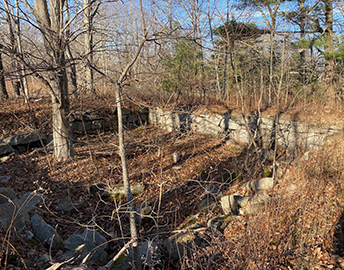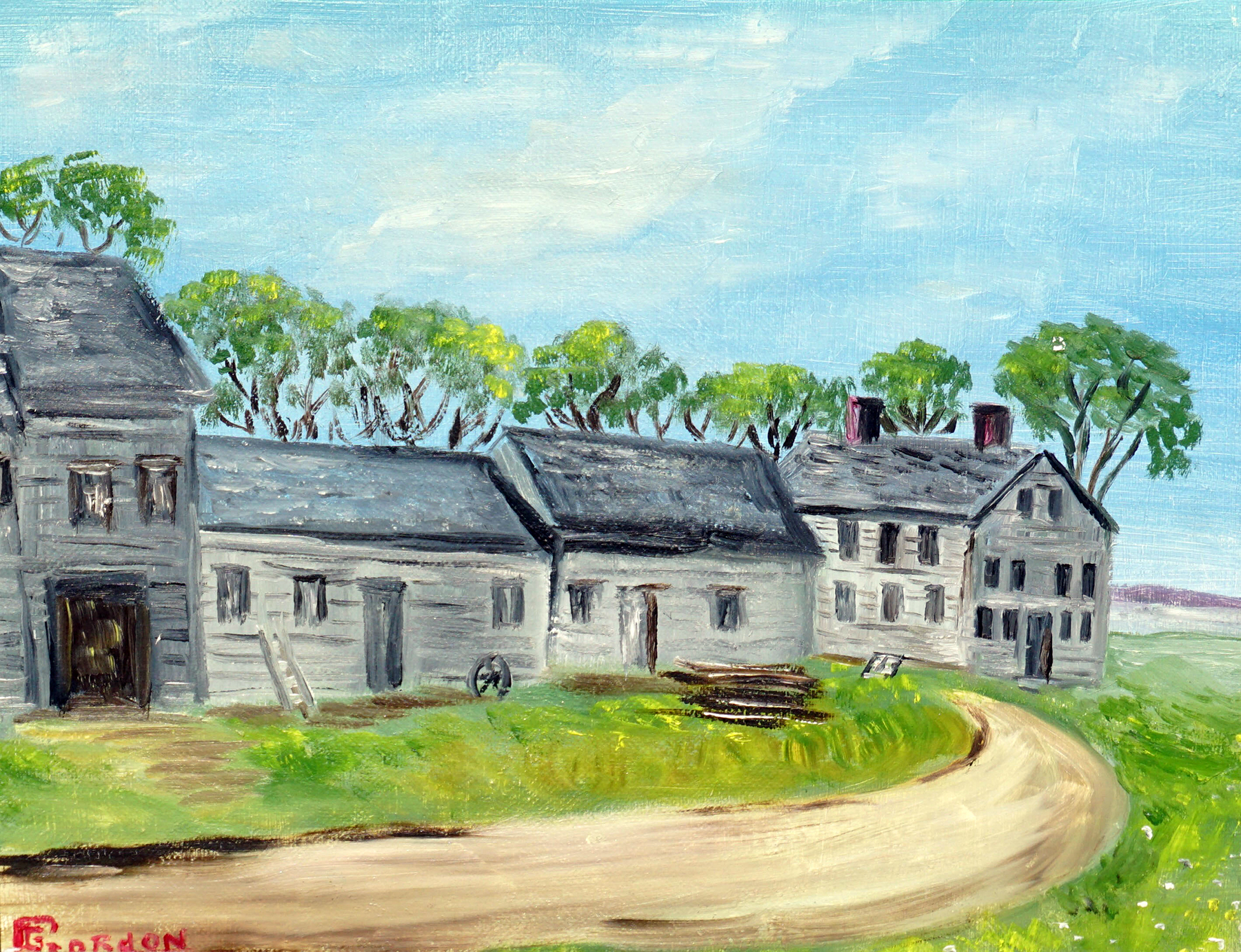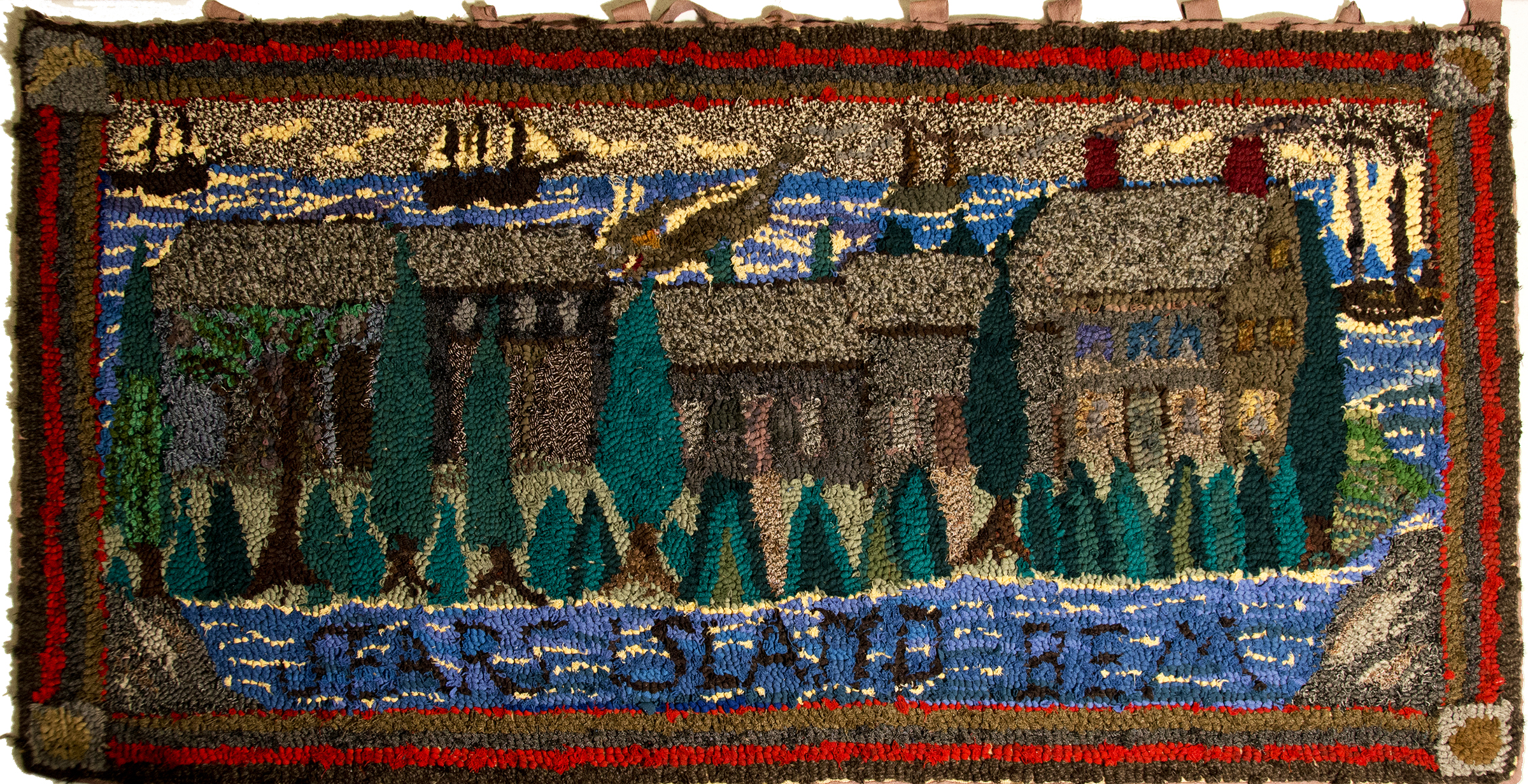From an autobiography by Gertrude Gordon (1899-1981)
These memories are excerpted from an autobiography of Gertrude Gordon, who lived on Sears Island for several years as a teenager. Additions, in italic, are from Sarah Nickerson, one of Gertrude’s granddaughters.
When I reached the age of sixteen and was in my first year of high school, my father was persuaded to leave the farm [in Belfast] and take over the management of a large lumber and farm business on an island off from Searsport known as Sears Island. This island was connected to the mainland at low tide by a sandbar. One could cross at half tide if one was familiar with the winding road.
The farm was a large two-story house that sat back about a quarter of a mile from the bar. It was grey and weather-beaten and strongly built, with its long sheds and barn all connected. At that time there were fields surrounding the house which have since grown up to bushes. There was a short path leading to the shore, lined with elms for some distance. From the back door a road wound gracefully around the barn and swung down to the shore.
Adds Sarah: To get to Grammy’s house you go to the left where there’s the apple tree and you walk up the path that’s now the Homestead Trail. There’s a meadow where the foundations are. The house had a small cellar, but these were huge buildings.

Photo by Rolf Olsen, courtesy of Friends of Sears Island.
There’s a tree growing up in the middle of the cellar now, and you can see the old bricks laying in the bottom of the foundation, all singed from when, in 1917, the house burnt. Some of them are black.
There was a crew of men working in the woods at that time. And there was farm work to do with a herd of cows to be taken care of and hens and chickens as well as a pair of turkeys. Sarah: And for some reason, they were raising sweet potatoes. I don’t know what that was about, but they were raising sweet potatoes. And of course, they milked the cows and collected the eggs from the chickens.
My mother, with the help of myself and the girl that later on became my sister-in-law, did the cooking and cleaning up for those of the men who stayed there the year round. Many of them went back and forth by way of boats to the cape where they lived, while some had small camps and boarded themselves.
Often on payday my father allowed me to pay the men off with checks. This was a duty of which I felt very proud. With few exceptions, they were a very good crew of men. We were really more like a huge family than employed and employer. My father was the kind of man that worked with the men as an equal and was much liked.
Sometimes we had a clambake on the shore with a campfire and a few of us sat around the fire telling stories or perhaps singing. I played the mandolin, and at one time there was a fiddler there and he was really something when it came to playing. We had many a game of ball in the evenings, and I was quite adept at sliding bases. Grammy used to talk about how the guys that worked there would play their banjos and she played the mandolin. She was real good at it. I know they also played a lot of checkers.
Inside the house were a number of rooms. The upstairs rooms were where the men slept, and it was the duty of us girls to make the beds and keep the rooms clean. They also did the men’s wash and got paid a little bit for it. They hung all their clothes out, because you didn’t have the washer and dryer at that time. So they did everything by hand. They had no electricity. They had kerosene lamps and wood stoves. So very different than nowadays. So they had to cut wood and keep fires going. In summer, too, they’d cook on the wood stove.

The men played many a prank and sometimes we girls did not escape either. One time we found our beds very uncomfortable. Someone had slipped horse hairs into them which had been cut into small pieces. These did not contribute to our comfort, being very itchy.
Downstairs was the kitchen, dining room, and two bedrooms. My father and mother occupied one and we girls has the other. Both of them had large fireplaces which I think I enjoyed more than anything else the place had to offer. My bed was the closest to the ire and I liked to lie there watching the flames and dreaming the dreams that young girls dream. The two windows had wooden shutters that pulled across to shut out the night.
Amusement didn’t stop at the farm. There were dances to go to and once a week, silent movies in the next town [Stockton Springs]. Once in a while there was a box social held at the schoolhouse with games which everyone joined in. Quite often I went to church and prayer meeting by boat to the Harbor Church.
I loved it there. Although it was necessary for me to help my mother in the kitchen, I still found a lot of spare time. I had continued school in Searsport for a while, but with the vagaries of the tide, I gave up school and studied at home.
While living on the island, a sad thing happened and one that completely changed my whole life. My mother walked out on us without any warning whatever. After one letter, I never heard from her again. My father was not only completely baffled but became very despondent. Thus, he gave up the job and we moved back to the farm in East Belfast. He must have gone through a terrible experience, but I was too young at the time to realize just how bad it was. I took over the housekeeping and became quite sensitive about my mother and was more reserved than ever. I was always in fear of offending someone. Time went on however and I became less reserved.
Printed by the family of Gertrude Gordon in her memory, June 1981. Compiled from Gertrude’s autobiographical writings, stories, and newspaper columns by a granddaughter, Sandra Gordon, Belfast, Maine.
A project of volunteers who care deeply about Sears Island




